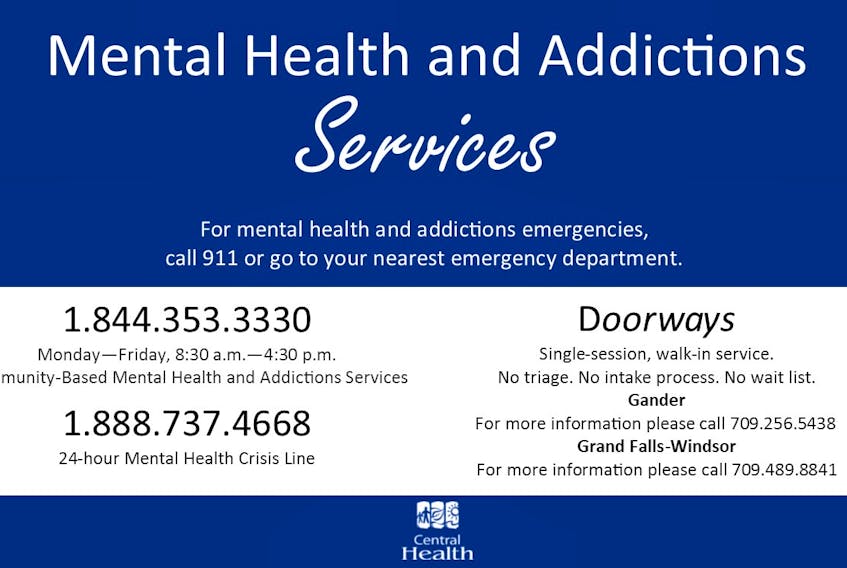By Dr. Jill Starkes and Dr. Liam Fardy
Jan. 31 marked Bell Let’s Talk Day – a day where Canadians all over the country were encouraged to have an honest, open conversation about mental health. Although that day has come and gone, it is important that the conversation about mental health continues. This is particularly true for the young people.
In Canada, mental health concerns in children and adolescents are on the rise, with 10-20 per cent of youth affected by a mental illness or disorder (learn more at https://cmha.ca/about-cmha/fast-facts-about-mental-illness). Unfortunately, struggles with mental illness sometimes come with fatal consequences. Suicide is now the second most common cause of death among Canadian teenagers and represents roughly 25 per cent of all the deaths between the ages of 15 to 19 years. In this province, a recent study conducted at the Janeway Children’s Health and Rehabilitation Centre showed that admissions for self-poisonings rose dramatically between 2008 and 2013 (https://academic.oup.com/pch/advance-article-abstract/doi/10.1093/pch/pxx149/4772861?redirectedFrom=PDF).
Health care providers, educators, parents, and everyone who interacts with young people have a role to play in addressing this health issue.
How do you know if your child or teen is at risk of developing a mental illness or at risk of suicide? Your child may:
- Show typical signs such as a depressed mood, but often the signs of mental illness can be subtle. This is particularly true during the teenage years when it can be difficult to tell the difference between typical adolescent behaviours and symptoms of mental illness.
- Have less interest in activities he or she used to enjoy.
- Have issues with concentration, increased or decreased sleep, decreased energy, or changes in appetite.
- Show a slip in school grades.
- Spend more time alone and less time with friends, or start using substances like alcohol or drugs.
Youth with an underlying mental illness can sometimes develop thoughts of suicide when experiencing stressful situations that teenagers frequently encounter. These situations include relationship break-ups, conflicts with family or peers, academic issues, in-person or cyber-bullying, recent coming out regarding sexual orientation or identity, and issues with the legal system. Likewise, victims of abuse can have suicidal thoughts if memories or feelings are triggered by a situation (https://www.cps.ca/en/documents/position/suicidal-ideation-and-behaviour).
We also know that certain groups of children and teens are at higher risk of suicide. Youth with a known mental illness or have attempted suicide in the past are at higher risk, as are people known to be impulsive – such as those with Attention Deficit Hyperactivity Disorder (ADHD). In addition, children of people struggling with their own mental illness or with a relative who has died by suicide are at higher risk.
If you are concerned that your child may be suffering from mental illness or may be at risk, what can you do? The best way to help someone with mental illness is to talk about mental illness. Many teens may not want to talk to their parents about their own mental health, but may be willing to talk about the topic in general. This may be a good way to start the conversation. It’s important that youth know that it’s ok to speak openly about this subject and that they are not the only ones with these experiences.
Resources and supports for children, teens, and their parents
- Call 911 or go to your nearest emergency department for mental health and addictions emergencies.
- School guidance counsellors
- Family physicians
- Central Health Community-Based Mental Health and Addictions Services (Monday – Friday): 1-844-353-3330
- 24-hour Mental Health Crisis Line: 1-888-737-4668
- Kid’s Help Phone: 1-800-668-6868; @KidsHelpPhone
- Canadian Mental Health Association: @CMHA-NL
- Cyberbullying: https://www.getcybersafe.gc.ca/cnt/cbrbllng/tns/index-en.aspx
Today’s children live in a world dominated by social media and technology, and as a result are facing challenges that are very unique to their generation. These issues can be uncomfortable or intimidating for us to discuss as parents and caregivers. It’s important to know that we don’t need to have all the answers before we start asking the questions and initiate the conversation about mental health and suicide with the youth in our lives. There are professionals in our community who can help you find the words and the resources you need to support a loved one.
Dr. Jill Starkes is the chief of pediatrics with Central Health. Dr. Liam Fardy is a pediatrician with the health authority.









